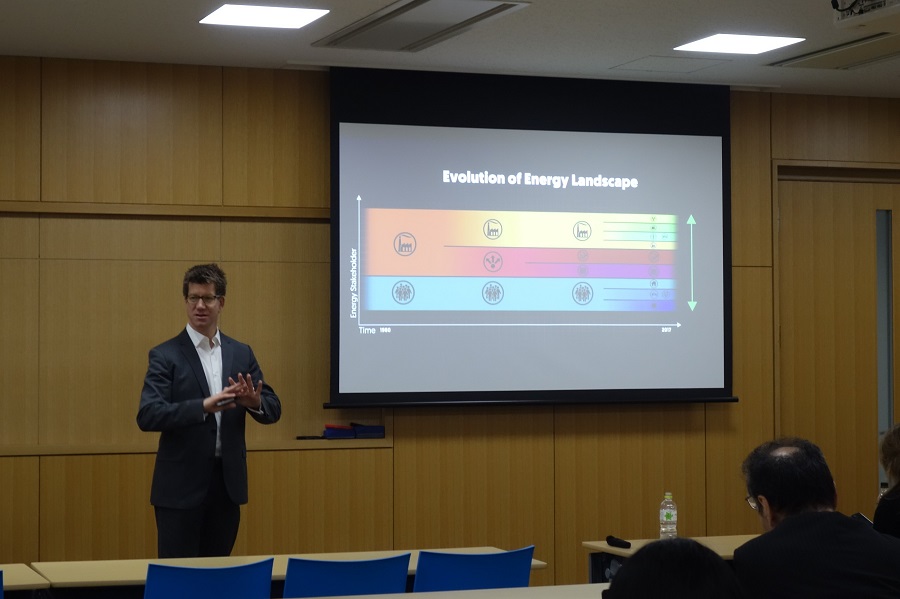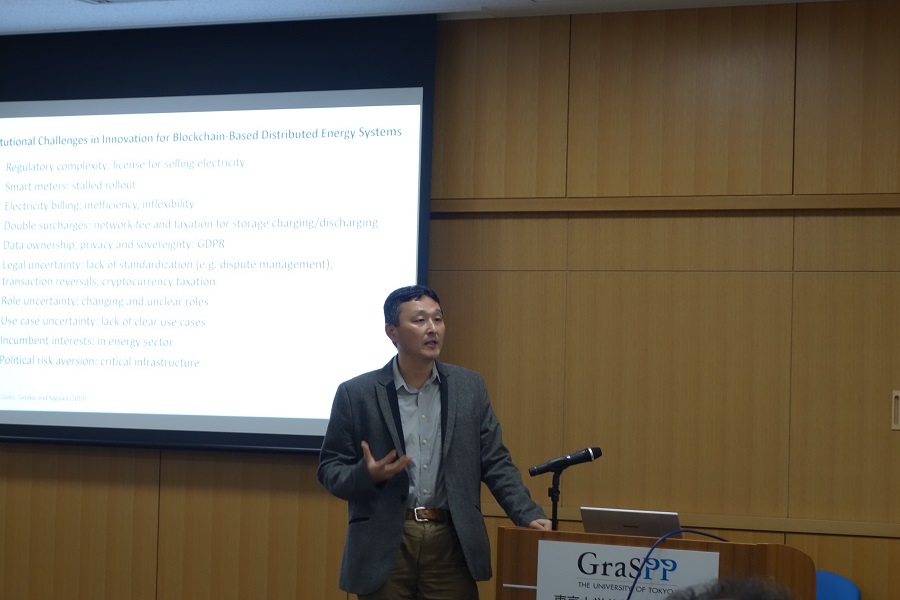Sustainable Energy without Fear : The Role of Artificial Intelligence
- Date:2019.10.25(Fri.)
- Time:16:30-18:00
- Venue:SMBC Academia Hall, 4F International Academic Research Building, the University of Tokyo
Map - Language:
English
- Capacity:
80 seats (Early registration recommended before completion)
- Hosted by:
German Centre for Research and Innovation Tokyo (DWIH Tokyo),
Institute for Future Initiatives, the University of Tokyo - Co-Hosted by:
Science, Technology, and Innovation Governance (STIG), UTokyo
The words ‘sustainable energy’ usually provoke both hope for a cleaner future – and doubts. How can the whole world make a fast, fair and affordable transition away from fossil fuels? The doubts are there for good reason. Never has the world experienced such a sweeping change of such a fundamental aspect of living. Energy markets and electricity infrastructure were designed to provide flexibility in supply: energy was centralized, reliable and predictable. Sustainable energy technologies, many of which are getting cheaper by the year, supply electricity that is often decentralized, variable and more difficult to predict. The result? The more ‘sustainables’ we introduce into our markets and grids, the more we suffer unintended consequences like price and grid instability. The answer? Flexibility in demand – we need to create markets that support real-time dynamic pricing, virtual storage capacity and nimble, trackable localized trading in smart cities. In this speech, Professor Wolfgang Ketter will show examples of how AI and machine-learning agents can run these fast and nimble markets for us.
- 16:00Doors open
- 16:30-16:35Opening remarks
Arisa Ema, Assistant professor, Institute for Future Initiatives, the University of Tokyo
- 16:35-17:20Lecture "Sustainable Energy without Fear: The Role of Artificial Intelligence"
Professor Wolfgang Ketter, Director of the Institute of Energy Economics and Chaired Professor of Information Systems, University of Cologne
- 17:20-17:30Discussant
Masaru Yarime, Associate Professor, Division of Public Policy, Hong Kong University of Science and Technology (HKUST)
- 17:35-17:50Q & A
- 17:50-18:00Wrap up and closing
Hideaki Shiroyama, Professor, Institute for Future Initiatives and GraSPP, UTokyo
Professor Wolfgang Ketter is Director of the Institute of Energy Economics and Chaired Professor of Information Systems, University of Cologne as well as Director of the Erasmus Centre for Future Energy Business and Professor of Next Generation Information Systems, Rotterdam School of Management, Erasmus University. He leads a team of interdisciplinary researchers in discovering how we can rapidly exploit advances in computing power to create a faster, more sustainable transition to clean energy and mobility. Ketter is advancing a new paradigm that builds communities of researchers who learn from each other in fast-paced competitive environments that model important societal challenges, such as the future of energy markets. He is co-founder of one of the world’s largest AI-driven market simulation platforms, Power TAC.
As fellow and member of the WEF Global Future Council on Mobility and Energy Policy Advisor to the German government, his focus is on developing collaboration with business and policymakers to field-test digitalization of the energy landscape in projects such as the EU’s Ruggedized smart-city initiative and the Rotterdam Port Energy Cooperative.
Masaru YARIME is Associate Professor at the Division of Public Policy in the Hong Kong University of Science and Technology (HKUST). He also has appointments as Honorary Reader at the Department of Science, Technology, Engineering and Public Policy in University College London, Visiting Associate Professor at the Graduate School of Public Policy in the University of Tokyo, and Visiting Associate Professor at the School of Environment and Society in the Tokyo Institute of Technology. His research interests center around science, technology, and innovation policy for energy, environment, and sustainability. He has contributed to many international initiatives, including the United Nations Environment Programme Finance Initiative on Environmental Risk Integration in Sovereign Credit Analysis, Intergovernmental Panel on Climate Change Working Group III Fifth Assessment Report, and the Expert Group on Policy Support Tools and Methodologies of the Intergovernmental Science-Policy Platform on Biodiversity and Ecosystem Services. Currently he is serving on the editorial board of the international journals, Sustainability Science, Environmental Innovation and Societal Transitions, Frontiers in Energy Research – Energy Systems and Policy, and Frontiers in Sustainable Cities – Governance and Cities. He received B.Eng. and M.S. in Chemical Engineering from the University of Tokyo and the California Institute of Technology respectively and Ph.D. in Economics and Policy Studies of Innovation and Technological Change from Maastricht University in the Netherlands. His previous appointments include Senior Research Fellow at the National Institute of Science and Technology Policy. Personal Web Page: http://yarime.net/
On October 25, 2019, Professor Wolfgang Ketter of the University of Cologne gave a seminar. The title of the presentation was “Sustainable Energy Without Fear: The Role of Artificial Intelligence” and he explained that concerns about renewable energy are raised not only in Germany but also around the world. He also showed that we do not need to fear this rise of sustainable energy, the opposite is true: we have excellent technology on hand to make this a successful transition.

There are “wicked problems” such as the impact of climate change and energy challenges that are too complex to identify and resolve. Wicked problems not only have many variables and stakeholders to consider, but they also change rapidly. These complex and difficult problems can no longer be solved by humans alone. Artificial intelligence (AI) can be used to find the optimal solution.
Professor Ketter gave an example of energy problems in smart cities. The share of renewable and sustainable energy in the electricity supply is increasing. When traditional energy sources such as coal and oil were used, ordinary people were just consumers. However, as the share of renewable energy such as solar power increased, more people became energy producers. These people, the consumer and the producer together, are called prosumers, and have an active role in the new energy landscape.
To distribute power efficiently, it is necessary to predict the balance between energy demand and supply by combining various energy sources and costs. “Flexibility” is key to dealing with complex problems with diverse variables, but renewable energy cannot respond flexibly because it depends on weather and seasons. Therefore, the power supply cannot be made fully renewable. AI is used to compute optimal solutions for complex puzzles.
There are still many technical, social, and economic challenges in promoting renewable energy. Technically, energy storage is still a challenge. In addition, there are privacy concerns about obtaining individual behavior and preferences to accurately predict supply and demand. However, new business models and innovations will emerge through the resolution of these issues. Professor Ketter runs an open source platform called Power Trading Agent Competition (Power TAC, www.powertac.org). Power TAC models complex power markets by autonomous machine-learning trading agents. This model considers the balance between electricity demand and supply in households and small businesses. Every year, a tournament is held to make the model more sophisticated, and various people, including startups, use the model. Professor Ketter concluded his talk by calling on Japanese students and industries to participate in the tournament and the platform.

Professor Yarime Masaru of the Hong Kong University of Science and Technology, a designated speaker, discussed institutional challenges in facilitating sustainable energy transitions and argued that a well-established institutional framework would be needed to promote Professor Ketter’s research and activities. For example, if a consumer can also be a producer, a license to sell electricity to other consumers will be required. Furthermore, to conduct energy transactions, it is necessary to develop technical standards and data-handling frameworks so that societal concerns about safety, security, and privacy will be addressed properly.
In his closing remarks, Professor Hideaki Shiroyama of the University of Tokyo pointed out that cooperation between various academic fields and sectors will become increasingly important in order to promote such discussions. The Institute for Future Initiatives in the University of Tokyo has research units related to energy and AI, but none of them has any specific point of contact at present. He concluded by suggesting that it is important to establish new agenda settings through these topics and to collaborate interdisciplinarily and internationally.
(Report written by Arisa Ema)